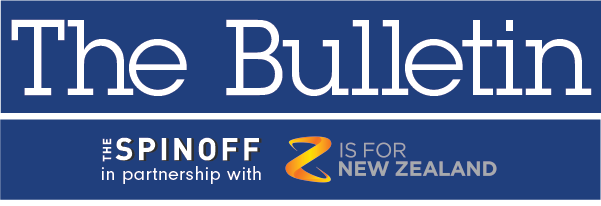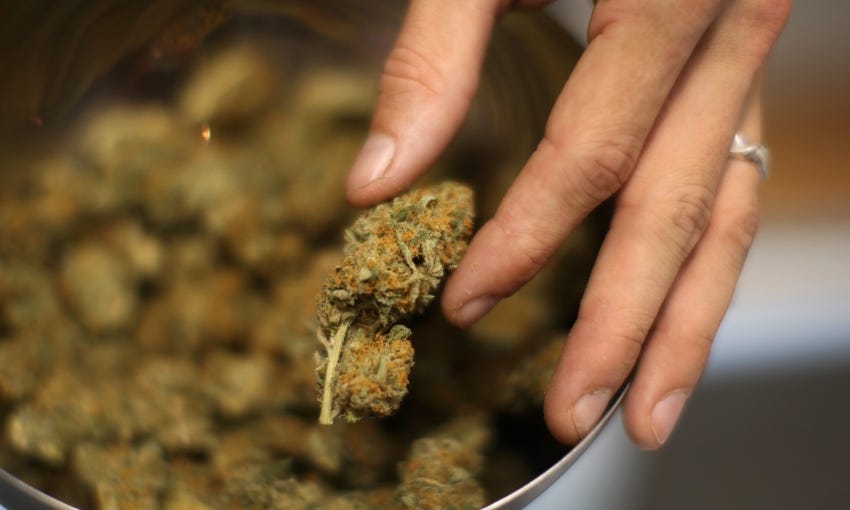Is a consensus on cannabis law reform finally emerging?
Nobody's super enthusiastic about decriminalisation, but a lot of groups could live with it
Good morning and welcome to The Bulletin for Wednesday 10 March, by Alex Braae for The Spinoff. Presented in partnership with Z Energy.
In today’s edition: Decriminalisation emerges as potential new direction for cannabis law reform, pokie opponents aghast at Ōtorohanga plans, and National election review delivered.
Image: Cannabis being handled at a dispensary in the US (Getty Images)
After the failure of the legalisation referendum, we're beginning to get a picture of what cannabis law reform could look like. The first story of note came from a Helen Clark Foundation survey, which Stuff reports shows that there is a combined majority for legalisation and decriminalisation. Crucially, 20% of those polled said they voted against legalisation, but would vote for decriminalisation. It's not clear what proportion of respondents would go the other way (pro-legalisation/anti-decriminalisation wasn't asked) but it's fair to assume that would be a smaller cohort.
So will something like this be taken through parliament? It's not yet clear if any parties or MPs are willing to put up a member's bill on the issue, and it has not been given any priority by the Labour government. That's relevant, because new research has suggested PM Ardern's neutrality on the issue may have lost it for the yes campaign, reports Newshub. It's a bit of a counterfactual to imagine what an earlier endorsement may have achieved, though the PM came out afterwards saying she had voted yes. Either way, that would probably leave it up to the luck of the member's bill ballot, if an MP were to put such a law forward.
A question on the subject was asked in the house yesterday, with Chlöe Swarbrick asking health minister Andrew Little about whether the current Misuse of Drugs Act supports government policy on drug harm reduction – he said it did. Follow ups saw Little noting reforms made in 2019 around police discretion. He also declined to rule out further liberalisation of drug laws after a question from National's Dr Nick Smith, but said the government would respect the result of the referendum. Dr Shane Reti, by contrast for National, told Waatea News earlier in the day that he'd like to see decriminalisation discussed.
The referendum campaign itself continues to be litigated as well, in a way that will be interesting to anyone who follows the movements and tactics of issue-based politics. Legalisation advocate Russell Brown has written a lengthy piece on Public Address, pointing out some flaws in the research mentioned above. He also had a bit of a crack at the No campaign, suggesting that various groups were set up in coordination with each other in order to get around spending rules . "It seems that the cleaving of Family First’s efforts in two was a successful effort to spend beyond the expenses cap for a single group – nearly half a million dollars versus the cap of $380,000."
In response to this, Family First's Bob McCoskrie said that his group, and the fellow travellers in Smart Approaches to Marijuana NZ (SAM-NZ) were distinct organisations running distinct campaigns. "I can confirm that at all times, both campaigns acted under the legal advice of the Electoral Commission throughout the whole process. In fact, they probably got sick of us asking questions. We were absolutely committed to acting within the law," said McCoskrie, who added concerns of his own about the cumulative spending of the yes campaign. He also noted that SAM-NZ disbanded immediately after the election, and that Family First's campaign was about calling for a no vote on both referendums.
So if decriminalisation was on the table, would the no campaign fire up again for another go? McCoskrie said that would depend on what exact proposal was put forward, and while Family First supported removal of heavy criminal sanctions on low-level users, it believed drug law should primarily discourage drug use, and criminal sanctions are part of that. He also said Family First agrees with the current police approach, describing it as 'decriminalisation-lite'. It is possible a workable consensus on such a bitterly contested reform might finally be forming – whether many people see it as the best policy approach in and of itself is another matter altogether.
The Problem Gambling Foundation is aghast at plans to change the pokies policy in Ōtorohanga, which would allow more machines to be put in. Local Democracy Reporter Andy Campbell has covered the policy change, which reverses a sinking lid in favour of approvals being possible on a case by case basis – in the process the number of pokies in the community could increase. Currently about $2000 a day goes into pokies in Ōtorohanga, money that can add up quickly in a small and not particularly wealthy town.
We don't know the full contents of the report, but National's election review has found "disunity, leaks, and poor behaviour" were a major factor in the party's poor result. The NZ Herald's (paywalled) Claire Trevett has reported that on the basis of an email sent out to party members, ahead of the report being discussed by the caucus of MPs. Party members will be invited to a series of meetings to discuss the review in more depth, but at this stage it still seems unlikely that the full report will be released in any sort of wide way. Just putting it out there – I for one would love to read it, and you've got my email address if you come across a copy.
Meanwhile, the future of the National party's strategic direction is currently up in the air. Some figures in the party have been suggesting a pivot towards culture war type positions – many of them imported straight from US politics and the online sphere. Ben Thomas has put together an excellent argument about why that would be a bad idea, and why (my paraphrase here) it's important to have the main opposition party be grounded in reality.
We’ve been doing our utmost to bring you all the coverage you need of the Covid-19 outbreaks and lockdowns. And we can’t do it without the generous support of our members. If you want to help out our news team with this and other big stories, please sign up here.
A large lag effect is being seen in the number of companies being liquidated over unpaid tax debt, reports Tamsyn Parker for the (paywalled) NZ Herald. That process slowed down significantly last year, with the taxmen being lenient due to the conditions of the pandemic. But they're now spiking back up slightly higher than normal levels. An IRD spokesperson said the organisation is encouraging struggling businesses to take advantage of government support, and tax expert Terry Baucher said such companies should be proactive about setting up instalment arrangements.
The Broadcasting Standards Authority has put out a new ruling on the use of te reo Māori on air. As Leonie Hayden reports for The Spinoff, the ruling is basically that the use of te reo does not in and of itself constitute a breach, after a flurry of complaints in that area. The increase in complaints in some ways indicates that broadcasters are increasingly comfortable and capable of speaking te reo on air, which is pretty cool and natural given it is an official language of the country.
A quick shout out to an organisation that does excellent work in the community: This week is the awareness week for Citizen's Advice Bureau, the network of offices that let people know what their rights and entitlements are. This is much more important than it might sound – having support systems in place is one thing, but actually helping people access them is something else entirely, and that's something government departments aren't always good at. The CAB put out a press release highlighting a few of their volunteers, and on reaching 50 years of operation.
Tell your friends, we've got a good job going. The Spinoff is seeking a new social media manager, to manage platforms for both us and Daylight Creative, our newly established content studio, which is itself a spinoff of The Spinoff. Applications close this week, so get in quick.
Got some feedback about The Bulletin, or anything in the news?
Drop us a line at thebulletin@thespinoff.co.nz
Right now on The Spinoff: Mark Hanna writes about police dogs, and how their cuddly publicity hides their significant danger to the public. Ollie Neas reports on peace group complaints that Rocket Lab's recent launches put New Zealand's nuclear free status at risk. Stewart Sowman-Lund reports on a survey that shows one in five New Zealanders are unlikely to get the Covid vaccine. If you've heard anything at all about a controversy around Dr Seuss books recently, primary teacher Louise Drummond has a very clear explanation for you. Simon Day writes about people making human connections at the dog park. Sam Brooks considers the curious obsession local radio host Kate Hawkesby has with erstwhile royal Meghan Markle.
And one of the most interesting episodes of Scratched to date has just launched – that's saying a lot too. The episode focuses on Jane Tehira, New Zealand's first triple-international women's sporting representative. What's really good about it is that it captures the cultural history of the 1950s, why sport was so important for Māori people moving from the country to the cities, and how that culture was passed down through whakapapa. The other thing that jumps out – it's really rare to see the stories of older people get told in such a thoughtful and sensitive way.
For a feature today, an excellent piece about how entrenched cultural assumptions will cut against necessary policy interventions, from one of the sharpest minds in New Zealand's political economy. Writing in his newsletter The Kākā, Bernard Hickey demolishes the myth that our climate emissions and housing problems can be beaten without some sacrifices in the way we live being made. Many people love their big suburban backyards and driving their utes, but they're incompatible with better policy. Here's an excerpt:
This skirmish illustrates just how hard it will be to change fundamental things in our culture. Cars aren’t just machines. Suburban homes aren’t just collections of wood, brick and tiles on dirt. They represent our identities, our aspirations and are woven into the fabric of who we are as New Zealanders. People spend all their adult lives striving for a house with a backyard for the kids, a ‘flash’ ‘car’ that can pull a boat to the beach and room enough for a BBQ with your friends and family on a sunny, summer’s evening.
To halve carbon emissions from cars and utes requires massive changes in the way we live our lives, run our society and power our economy. Firstly, it would require a lot of trips in cities of less than 10kms that are currently done in cars, SUVs and utes to happen on buses and trains, or through walking and cycling. That means a lot more people living in denser housing close to city centres, and bus and train networks with taxpayer and ratepayer subsidies closer to $50b than $5b. That means a lot more apartment and townhouse living, and a lot more people choosing not to have their own cars. Given our current population growth rate of around 1.5% per year, it would also require a lot more vehicles to be smaller, lighter and electric powered.
NZ Cricket lobbied Dr Ashley Bloomfield for players to get early access to the Covid vaccine, while he was a guest at a game, reports Liu Chen for Radio NZ. A bunch of them are heading offshore for the IPL soon, ahead of the Test Championship mid-year. It seems unlikely at this stage that the lobbying efforts have come to much. We're yet to see the exact breakdown of vaccine prioritisation, but I'd be pretty surprised if sportspeople ended up bumped up the list. In terms of other major events, reports emerged this morning the Tokyo Olympics would be going ahead without spectators.
That's it for The Bulletin. If you want to support the work we do at The Spinoff, please check out our membership programme








First to thank you for the Bulletin from across the ditch, Hawkesbury NSW. With regard to the law changes Marijuana, it would be a good idea perhaps to enlighten all individuals on the history of psychoactive substances which goes back thousands of years for most of the global communities. Initiation ceremonies still abound and many important and highly respected academics and research fellows, authors have provided fantastic detailed history as to the use of natural psychoactives including Professor Terence McKenna 'Food of the Gods.' and of course many more online forums include positive outlooks for comprehension and safe use of hallucinogens. When, not if, Marijuana becomes de-criminalised, folks should be able to grow one or two plants of their own, thus hopefully eliminating the criminal elements who seduce and induce the use of other more harmful substances. It should be noted, one of the most underlined reasons why people become addicted is because of feelings of alienation, boredom, lack of attainment, loss of self esteem and hence the need to block out their personal lives. Shared Ceremonial performance and ritual within a community have largely been replaced with the assumption we should all be slaves to the system - hence the rebellion and the need for many to resort to methods to blot out their perceived failures and inadequacies. Everyone should be encouraged to learn the history of why and how communities survived with incorporated ceremonies of sharing and caring....we have a long way to go but do live in hope!!